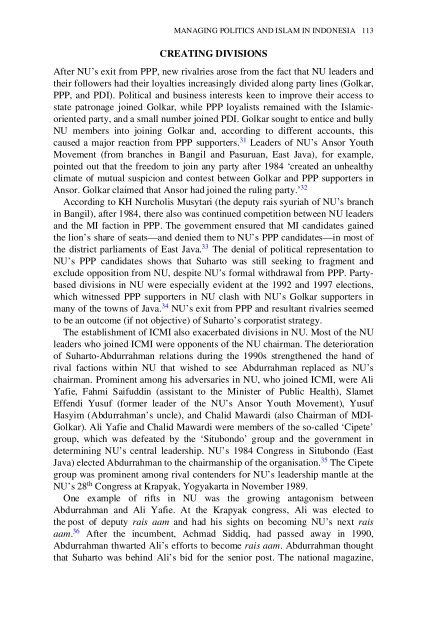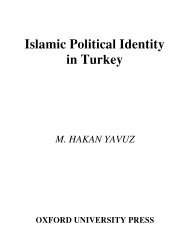You also want an ePaper? Increase the reach of your titles
YUMPU automatically turns print PDFs into web optimized ePapers that Google loves.
MANAGING POLITICS AND ISLAM IN INDONESIA 113CREATING DIVISIONSAfter NU’s exit from PPP, new rivalries arose from the fact that NU leaders <strong>and</strong>their followers had their loyalties <strong>in</strong>creas<strong>in</strong>gly divided along party l<strong>in</strong>es (Golkar,PPP, <strong>and</strong> PDI). Political <strong>and</strong> bus<strong>in</strong>ess <strong>in</strong>terests keen to improve their access tostate patronage jo<strong>in</strong>ed Golkar, while PPP loyalists rema<strong>in</strong>ed with the <strong>Islam</strong>icorientedparty, <strong>and</strong> a small number jo<strong>in</strong>ed PDI. Golkar sought to entice <strong>and</strong> bullyNU members <strong>in</strong>to jo<strong>in</strong><strong>in</strong>g Golkar <strong>and</strong>, accord<strong>in</strong>g to different accounts, thiscaused a major reaction from PPP supporters. 31 Leaders of NU’s Ansor YouthMovement (from branches <strong>in</strong> Bangil <strong>and</strong> Pasuruan, East Java), for example,po<strong>in</strong>ted out that the freedom to jo<strong>in</strong> any party after 1984 ‘created an unhealthyclimate of mutual suspicion <strong>and</strong> contest between Golkar <strong>and</strong> PPP supporters <strong>in</strong>Ansor. Golkar claimed that Ansor had jo<strong>in</strong>ed the rul<strong>in</strong>g party.’ 32Accord<strong>in</strong>g to KH Nurcholis Musytari (the deputy rais syuriah of NU’s branch<strong>in</strong> Bangil), after 1984, there also was cont<strong>in</strong>ued competition between NU leaders<strong>and</strong> the MI faction <strong>in</strong> PPP. The government ensured that MI c<strong>and</strong>idates ga<strong>in</strong>edthe lion’s share of seats—<strong>and</strong> denied them to NU’s PPP c<strong>and</strong>idates—<strong>in</strong> most ofthe district parliaments of East Java. 33 The denial of political representation toNU’s PPP c<strong>and</strong>idates shows that Suharto was still seek<strong>in</strong>g to fragment <strong>and</strong>exclude opposition from NU, despite NU’s formal withdrawal from PPP. Partybaseddivisions <strong>in</strong> NU were especially evident at the 1992 <strong>and</strong> 1997 elections,which witnessed PPP supporters <strong>in</strong> NU clash with NU’s Golkar supporters <strong>in</strong>many of the towns of Java. 34 NU’s exit from PPP <strong>and</strong> resultant rivalries seemedto be an outcome (if not objective) of Suharto’s corporatist strategy.The establishment of ICMI also exacerbated divisions <strong>in</strong> NU. Most of the NUleaders who jo<strong>in</strong>ed ICMI were opponents of the NU chairman. The deteriorationof Suharto-Abdurrahman relations dur<strong>in</strong>g the 1990s strengthened the h<strong>and</strong> ofrival factions with<strong>in</strong> NU that wished to see Abdurrahman replaced as NU’schairman. Prom<strong>in</strong>ent among his adversaries <strong>in</strong> NU, who jo<strong>in</strong>ed ICMI, were AliYafie, Fahmi Saifudd<strong>in</strong> (assistant to the M<strong>in</strong>ister of Public Health), SlametEffendi Yusuf (former leader of the NU’s Ansor Youth Movement), YusufHasyim (Abdurrahman’s uncle), <strong>and</strong> Chalid Mawardi (also Chairman of MDI-Golkar). Ali Yafie <strong>and</strong> Chalid Mawardi were members of the so-called ‘Cipete’group, which was defeated by the ‘Situbondo’ group <strong>and</strong> the government <strong>in</strong>determ<strong>in</strong><strong>in</strong>g NU’s central leadership. NU’s 1984 Congress <strong>in</strong> Situbondo (EastJava) elected Abdurrahman to the chairmanship of the organisation. 35 The Cipetegroup was prom<strong>in</strong>ent among rival contenders for NU’s leadership mantle at theNU’s 28 th Congress at Krapyak, Yogyakarta <strong>in</strong> November 1989.One example of rifts <strong>in</strong> NU was the grow<strong>in</strong>g antagonism betweenAbdurrahman <strong>and</strong> Ali Yafie. At the Krapyak congress, Ali was elected tothe post of deputy rais aam <strong>and</strong> had his sights on becom<strong>in</strong>g NU’s next raisaam. 36 After the <strong>in</strong>cumbent, Achmad Siddiq, had passed away <strong>in</strong> 1990,Abdurrahman thwarted Ali’s efforts to become rais aam. Abdurrahman thoughtthat Suharto was beh<strong>in</strong>d Ali’s bid for the senior post. The national magaz<strong>in</strong>e,




